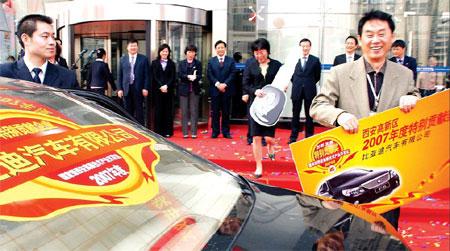
A BYD representative holds an award after his company was honored by the Xi'an High-tech Zone administrative committee for being among the city's top taxpayers in 2007. The once award-winning firm will be fined 2.95 million yuan for illegally using land in the city. [China Daily]
Chinese battery and low-cost car manufacturer BYD Co recently hit a bump on its road to become a leading global automaker as it was accused of illegal land use.
Last Wednesday, China's Ministry of Land and Resources said on its website that BYD will be fined 2.95 million yuan for illegally using land in Xi'an, Shaanxi province.
Corporate facilities constructed on the area in question will be confiscated.
According to the ministry's announcement, BYD signed an agreement with Xi'an in July 2009 to acquire 330 hectares of land and build a 200,000-unit plant.
The company began construction last December, and so far has built seven factories and other facilities covering 49 hectares.
But of the acquired land, nearly 300 hectares is classified as "basic farmland" reserved for agriculture use, said the ministry announcement.
According to Chinese law and related regulations on land management, companies must get approval from the State Council if they want to build on basic farmland.
Therefore, it was decided, BYD had violated the rule by only seeking approval from the Shaanxi provincial government.
Later, in its filing to the Hong Kong stock exchange, BYD said the ministry's decision "will have no adverse impact on the company's business operations and financial status".
It also said its Xi'an construction projects were still in the initial stages, and had not yet contributed to production, sales or profit.
Analysts agreed the incident will have little negative impact on the company. They noted the fine was small, and said it was possible seized buildings could be returned to BYD after negotiations.
The ministry did not say how the government would deal with the facilities confiscated, leaving room for possibilities, said Zhang Xin, an auto analyst at Guotai Jun'an Securities.
Analysts also said BYD's reckless move of not following regulated procedures in land requisition in Xi'an revealed its eagerness in capacity expansion.
But the company's domestic sales have declined in the past few months. In September, BYD sold only 33,085 cars, a 24.9 percent drop from the same month last year.
The overall passenger car market increased 19.3 percent in this period.
In the first nine months of this year, BYD moved a total of 386,214 vehicles, accounting for about 64 percent of its 600,000-unit target, which is already a 25 percent cutback from the original goal of 800,000 units.
Due to sluggish sales and high inventory , several BYD dealers quit its sales network in August.
Fast expansion
Analysts said the trouble BYD encountered could be attributed to an overly rapid expansion, a common problem for Chinese brands.
Homegrown brands are infected with "low-speed phobia," said independent analyst Jia Xinguang in a previous report on Chinese-language media.
He noted that Chinese carmakers should try to raise profit margins instead of merely selling lots of low-cost cars.
Although a newcomer to the auto market in 2003, BYD became one of China's top 10 car producers last year when it sold 448,000 vehicles.
Its F3 model, retailing between 50,000 and 90,000 yuan, was ranked the best-selling sedan in the nation.
The company aspired to beChina's top automaker by 2015 and a world industry leader by 2025, with annual sales of more than 13million vehicles.
Warren Buffett, who holds a 10 percent stake in BYD, visited its China facilities and attended promotional events last month, confirming his continued support of the automaker.
Yet, media commentators said Buffett's trip will make only a temporary difference in sales. Only a correct development strategy can aid BYD over the long-term, they reported.
BYD closed at HK$55.60 last Friday, up 1 percent from the closing price of Thursday.





